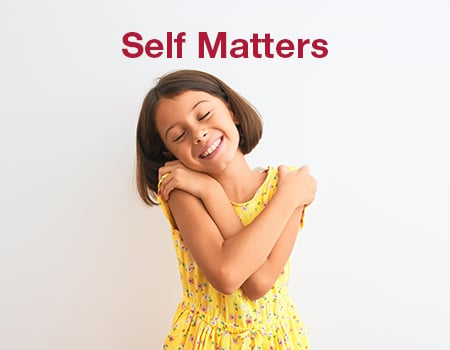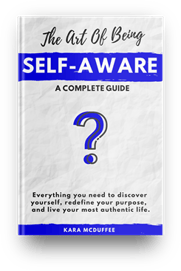My friend's lack of awareness around her body's choices almost destroyed our relationship - and her life.
At the beginning of the pandemic, my friend lost her job. The lack of stability fueled her already-powerful anxiety. Usually full of inverse charisma, she chose to turn to many of her unhealthy coping mechanisms.
The problem was that she didn't realize she was making these choices. While I observed the harm that the substances were causing her, she lacked the awareness to recognize it. Sure, she knew she felt stressed - but she never questioned her choices because they felt natural. Her body acted without her consciousness.
Eventually, my friend found herself in a "point of no return," which served as her wake-up call. She agreed to therapy, and her newfound attention toward self-awareness gave her a new perspective that she didn't have before. She began to recognize the root of her anxiety and the emotions behind her actions. More importantly, she finally saw how much her body affected her choices.
Over time, she learned to make healthier choices. Ultimately, these choices became her new default.
Not all of us struggle with substances or loss of employment. Nevertheless, my friend's story contains a universal truth that we all share: our bodies affect our choices in a powerful way. Unfortunately, most of us have no idea.
We lack the embodiment self-awareness to see how our physical states control our actions.
Self-Awareness Crash Course: Our Bodies Affect Our Choices in A Powerful Way
We like to believe that our cognitive thinking controls our behaviors. After all, it makes sense that we decide on an action, and then we do it. Simple, right?
Years of evolutionary history prove otherwise. Our emotions have a far more powerful influence than we realize. In fact, the most primal part of our brain, located at the base of our spinal cord, is actually our control center - and emotions drive it.
This means that our emotions come first and thoughts come second. It also means that some of our most deeply-rooted survival instincts play a huge factor in what we do.
For example, a desire for pleasure motivates most of our actions. (This is why the most successful people can override this tendency and work toward delayed gratification.) We avoid pain, which means that anything that causes us anxiety, suffering, or discomfort becomes enemies to avoid. (Even if temporary discomfort ultimately leads to positive growth.)
According to embodiment expert Amanda Blake, our fundamental emotional states automatically affect the way we move through the world.
This fact isn't inherently bad. However, it can become deadly when we lack the self-awareness to recognize it.
Amanda Blake on Embodied Self-Awareness: Recognize How Our Bodies Affect Our Choices
Amanda Blake is a neuroscience teacher, a Master Somatic Coach, and a published author. She studied the relationship between our body and our brain for years (and she recently wrote a book about it).
According to Amanda, there are two vital types of self-awareness: Conceptual Self-Awareness and Embodiment Self-Awareness. Both involve our brains and bodies, but they operate differently.
Conceptual Self-Awareness
Conceptual self-awareness is our ability to identify our identities. It encompasses understanding our past, present situations, and future goals. When we are conceptually self-aware, we can envision who we are and who we want to become. It helps us find our life purpose (even if many biases and societal messages get in our way).
This type of self-awareness is more common. It's also probably the type you focus on most in your journals. Don't worry; conceptual self-awareness is incredibly important. But until you learn to practice the second type of self-awareness, you'll never put your complete conceptual identity into action.
Embodiment Self-Awareness
Embodiment self-awareness is our ability to feel ourselves in space. It encompasses our senses, and we must tap into different neural networks to become aware of these sensations.
Because this type of self-awareness involves our sensory experience, it can only reside in the present moment. As soon as we turn to the past or the future, we've taken ourselves out of the present, physical awareness.
Embodiment self-awareness might include things like:
- Identifying the emotion you're feeling
- Recognizing the physical "tells" in your body
- Feeling what your instinctive urges want you to do
- Labeling your sensory experience, both internally and externally
Why Embodied Self-Awareness Can Change Us
Amanda Blake explains that developing our embodiment self-awareness will allow us to reclaim more control over our lives. How? When we connect more with our bodies, we can see how our bodies affect our choices.
Here are three essential connections that embodiment self-awareness can teach us:
- We can surface Invisibles that are at play in our choices.
What percent control do you think you have over your choices? Most of you would probably answer, "One hundred percent." The reality, however, is far less. According to Amanda, Invisibles in our body are constantly influencing our choices.
These Invisibles stem from our evolutionary roots, but they can take on different forms for different people. Maybe you have a deep fear of commitment that drives your action. Or perhaps you're still grappling with internal messages that developed in your childhood. For me, my need to achieve flares up in just about everything that I do.
When we surface these Invisibles, we can begin to question them.
- Our automatic responses trap us.
If there's anything humans hate, it's to be trapped. That's why so many of us buck at external feedback or vulnerability - we want to be in the driver's seat. Once again, the problem is that we only feel like we're in the driver's seat. In reality, the car's riding on physical responses out of our control.
Every time we act, a neural pathway in our brain lights up. The more times we do something, the more that pathway solidifies. It doesn't take long for our brain to accept this "choice pattern" as the norm - and we stop questioning it altogether.
Remember, our emotions drive our behavior. And until our cognitive awareness catches up, we're trapped by these automatic responses.
- Embodied behavior is relearnable.
Fortunately for us, these automatic responses and patterned behaviors aren't permanent. We can teach ourselves to create new neural pathways and different responses.
For example, when my friend felt anxious, she automatically reached for substances. Her body’s default pattern became: stress > substances > (temporary) relief. And after doing this pattern for so long, it became ingrained and comfortable.
After realizing how our bodies affect our choices, my friend was able to rewrite the script. She interrupted her typical pattern and replaced "substances" with other healthy coping mechanisms. Over time, her body's default reaction to anxiety changed.
It takes work, but over time, we can teach our bodies to react differently.
Steps to Develop our Embodiment Self-Awareness and Harness Power Over Our Choices
If any of this sounds easy, it isn't. But, if you haven't already realized it, it's incredibly worth it. To learn more about developing your embodiment self-awareness, I highly recommend checking out Amanda Blake's site Embright. The website is full of free resources and helpful links.
To get you started, here are five steps she lays out for you to begin your embodiment journey. Feel free to sit down with your journal and consider each one in turn.
-
Become aware of your body.
Tune into how you're feeling in the present moment. Recognize your sensory feelings, both internally and externally. To do this, you'll have to quiet your cognitive thinking and turn up your "body" awareness.
- How does each part of your body feel?
- What emotion are you experiencing?
- How is that emotion manifesting in your body movements and sensations?
-
Surface the Invisibles in your behavior patterns.
We all have Invisibles influencing our choices. Try to uncover your catalyst emotions and default patterns. Your journal can help, as well as creating two-sided conversations.
- What do you think you're choosing to do but aren't?
- What does your body do automatically?
-
Open doorways to make different choices.
Now that you've recognized the Invisibles influencing you, you can take strides toward changing them. Consider what emotions lead to what responses. Then, see how you can make different choices and develop your self-management.
- What responses do you want to change?
- What choices would serve you better in the long run?
-
Practice making different choices.
As with anything in life, if we want something to get easier, we must practice it. Practice making choices that are different from your usual go-to's. In doing so, you'll begin to create new neural pathways in your brain.
- How can you practice acting out different choices?
- What changes have you made in your life that prove you can evolve?
-
Build your choice capacity.
By practicing different choices, you will build your choice capacity. An expanded choice capacity means that you'll no longer be trapped by one or two automatic responses. Instead, you'll create more freedom to respond in diverse, positive ways.
- What do you do differently now than you did when you were younger?
- How do you look at decision-making differently?
- What factors do you take into account when making choices?
-
Transform your life.
It shouldn't be a surprise that better choice-making will help you transform your life. As you explore the freedom that your newfound choice capacity gives you, you can identify what gives you meaning and purpose. Then, you can put that into action by living more intentionally.
- What transformation would you like to see in your life?
- What does living intentionally look like for you?
- What choices would you want at the center of a purposeful life?
Conclusion: How Our Bodies Affect Our Choices in a Powerful Way (And How We Can Harness This Power)
Embodiment self-awareness is not about overriding your bodies with your thinking. It's about connecting more with your bodies, freeing yourself from the traps of human nature, and living a more intentional life.
To learn more about Amanda Blake and what she does, check out her website embright.org. You can also listen to her discuss these concepts on The Embodiment Podcast.

Kara McDuffee is the writer and founder of My Question Life, a community dedicated to helping you discover yourself and find the answers you’re searching for. She gives you the questions you need to become more self-aware and vulnerable in your everyday life. To read her posts or download her free eBook The Art of Being Self-Aware, check out her blog.




Leave Comment